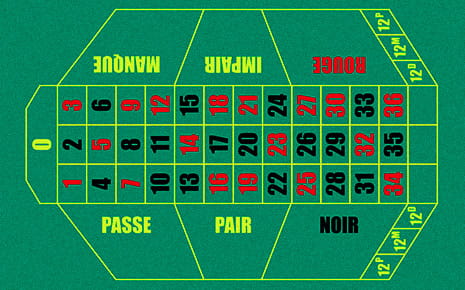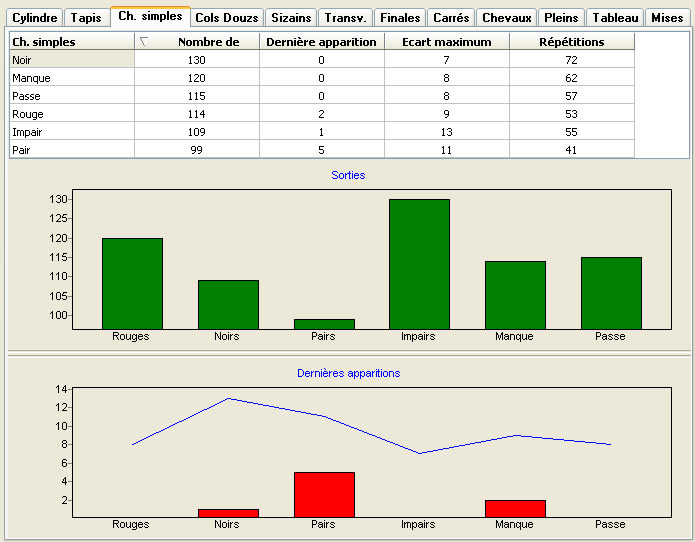Roulette Passe Et Manque
- Roulette Passe Ou Manque
- Roulette Casino Passe Et Manque
- Roulette Passe Un Manque
- Jeu De La Roulette Passe Et Manque
- What does 'passe' and 'manque' mean on a roulette board? We have a game just got it out after years and can't work out what it means. They are in the same section as Red and Black and odd and even.
- This cardinal is used, except when one falls, then one says Prime Rouge, Impair et manque. Betting options French roulette Then the winning bets are paid, starting with the simple chances, that pay 1 to 1 and ending with any bets on a full number (and square payout 36 times the bet).
Another of the so called “Even Money Bets” you can play in roulette, is the High, Low bet (also known as Manque/Passe). This is probably the least popular of this type of outside bets. I don’t know why, as it gives you the same odds as playing reb/black or odd/even.
Well- you know what they mean on a roulette table. Manque covers numbers 1-18, it’s an even money bet like the odd/even bet, and Passe covers the numbers from 19-36 (there are always 36 numbers on a French wheel- it’s a variant of a European Wheel. The high/lo bet is also known as Manque/Passe, particularly on French tables of course.
Even though the odds are the same, we prefer to mix things up a bit (call us superstitious) when we are playing systems that use the even money bets (like the Labouchere, Martingale and Fibbonacci System for instance).
In reality, you have exactly the same odds playing the high low numbers as you would do playing the colours as the roulette wheel has no memory. And numbers dropping in previously has no direct bearing on what is going to drop in moving forward.
ScreenShot Showing a Hi/Lo bet on French Premium Roulette at Omni Casino.
Play Betway Casino French Roulette
Manque and Passe
You’ll hear Manque (1- number 18) and Passe (19- number 36) if you play roulette in the French Riviera or Monaco. What does Manque and Passe mean?
Well- you know what they mean on a roulette table. Manque covers numbers 1-18, it’s an even money bet like the odd/even bet, and Passe covers the numbers from 19-36 (there are always 36 numbers on a French wheel- it’s a variant of a European Wheel.
The high/lo bet is also known as Manque/Passe, particularly on French tables of course.
Roulette Passe Ou Manque
Litterally, Manque means “fail”- the ball has failed to land on a number higher than half the numbers, and on the other hand, if you hit 19-36, the ball has “dépasse la moitié”, or gone over half.
La Partage Applies on A French Roulete Wheel
Now if you are playing Manque/Passe instead of Hi/Lo (or 1-18/19-36), the chance are that you are playing on a French Roulette wheel. And this is a good thing for this bet, because French tables apply the “La Partage Rules” on these bets (on all even money bets as a matter of fact). Half of your bet will be returned if you bet on Manque or Passe and the ball settles in the zero pocket. And this brings the house edge down to around 1.3%, which is not bad. Compare that to the American tables which have a double zero roulette wheel. The house edge shoots up to 5.2% on these.
The Best Casino and Variant to play High/Low bets in roulette?
Well, ideally you should play these bets on a French Roulette variant as the odds are better (as they play La Partage). Try the French Roulette over at Betfair Roulette.
Roulette Casino Passe Et Manque
French Roulette is a form of Roulette which is played in casino’s only. The game is known as the queen of the casino games because it is one of the oldest games in the casino. At French Roulette, players put chips on a green playing table which has the numbers 1 to 36 on it. Besides that players can bet on single bets, these are the so called rouge and noir bets, or pair and impair bets which are the equal and the unequal numbers.| Casino's | Bonus | Account |
|---|---|---|
| €/$1.500,- | Open | |
| €/$ 888,- | Open | |
| 1 Bitcoin | Open | |
| €/$ 400,- | Open |
Roulette Passe Un Manque
French table roulette


When the bet is made, the croupier swings the turntable to the left, opposite to the direction of the clock and he or she will immediately shoot a small bullet in this turntable. The name of the croupier who shoots the tiny ball into the playground is called the bouleur. The order of the numbers in the turntable is aimed numbers manque (1-18), passe (19-36), rouge, noir, pair and Impair to alternate as much as possible. (This design is attributed to the French mathematician, physicist and philosopher Blaise Pascal.) At one point, the exclamation rien ne va plus, “nothing is more ‘, there should no longer be used. Eventually the ball stops on the winning number, and this number the croupier calls out, in French, accompanied by the single winning opportunities, neuf, rouge, Impair et manque. This cardinal is used, except when one falls, then one says Prime Rouge, Impair et manque.
Betting options French roulette
Then the winning bets are paid, starting with the simple chances, that pay 1 to 1 and ending with any bets on a full number (and square payout 36 times the bet). If 0 is disappear the outside bets and prison and be put on a dedicated line, all other bets lose. If bets and prison alone win the next coup, they come free again, no profit or loss, otherwise they are lost. If the 0 twice in a row is the bets that are already en prison slid over the line and prison and the single opportunity to come out twice. Instead of prison and a player can also communicate with the bank bet. This gives the casino an advantage over smaller bets on simple chances, then on the other bets. The rule also applies, as French Roulette is offered in American style, but not in the real American roulette.
French Roulette has several betting options which are explained below.
Chances Simples; Single opportunities; 18 numbers; Rouge Noir, Pair, Impair, Manque (1 t / m 18) Passe (19 t / m 36) pays 2 times the bet (1 to 1). Douzaines; 12 numbers; “Premiere” (1 t / m 12), “Moyenne” (13 t / m 24), “Dernière” (25 t / m 36), pay three times the bet (1 to 2). Column; 12 numbers: the numbers 1 / m 36 are arranged in three columns, among the boxes 34, 35 and 36 you can bet on that column. The first column therefore contains numbers 1, 4, 7, 10, 13, .. t / m 34. pays the same as Douzaines. Transversal simple; 6 numbers, which lie next to each other in two rows, for example 10, 11, 12, 13, 14, and 15. Paying 6 times the bet (1 to 5).
Carré; 4 numbers, which lie together in a square. For example, the first is next to the two upstairs and the fourth in the top left of 5. By placing a bet on the point between these four numbers one plays these four numbers. Another example of a square is 32, 33, 35 and 36. Carré can also be placed in combination with the 0, which is 0, 1, 2, and 3. Paying 9 times the bet (1 to 8). Transversal pleine; Three numbers in a row for example 1, 2 and 3, or 22, 23 and 24. A tranversale and square can also be played with the 0 in the combinations 0, 1 and 2 or 0, 2 and 3. Pays 12 times the bet ( 1 to 11).
Cheval; 2 numbers, which are located above and below each other, or side by side, for example, 2, and 5 or 4 and 5 or 5 and 6 or 5 and 8. Paying 18 times the bet (1 to 17). Square; single number pays 36 times the bet (1 to 35).
Jeu De La Roulette Passe Et Manque

Furthermore, people can bet on 0-play “(jeu de zéro), ‘big series,’ ‘small series’, lesson Orphelins or a song with ‘neighbors’ (x et voisins). They play a certain amount of numbers, which are spread throughout the deployment tableau, but on the turntable are all adjacent to each other. These bets are placed the dealer on behalf of the player. In French Roulette American style, the dealer has a separate image of the order of the numbers on the dial next to the insert panel, which he can place these bets quickly. With traditional French roulette croupiers know the order of the numbers on the dial by heart. In true American roulette (with a 0 and a 00), these betting options do not exist, the numbers are there a different order on the turntable.